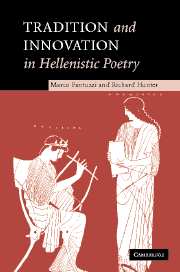Book contents
- Frontmatter
- Contents
- Preface
- List of abbreviations
- 1 Performance and genre
- 2 The aetiology of Callimachus' Aitia
- 3 The Argonautica of Apollonius and epic tradition
- 4 Theocritus and the bucolic genre
- 5 Epic in a minor key
- 6 The style of Hellenistic epic
- 7 The epigram
- 8 The languages of praise
- 9 Hellenistic drama
- 10 Roman epilogue
- Bibliography
- Index of passages discussed
- General index
2 - The aetiology of Callimachus' Aitia
Published online by Cambridge University Press: 22 September 2009
- Frontmatter
- Contents
- Preface
- List of abbreviations
- 1 Performance and genre
- 2 The aetiology of Callimachus' Aitia
- 3 The Argonautica of Apollonius and epic tradition
- 4 Theocritus and the bucolic genre
- 5 Epic in a minor key
- 6 The style of Hellenistic epic
- 7 The epigram
- 8 The languages of praise
- 9 Hellenistic drama
- 10 Roman epilogue
- Bibliography
- Index of passages discussed
- General index
Summary
CALLIMACHUS
The figure of Callimachus dominates the poetry and intellectual life of the third century bc. Callimachus was a native of Cyrene, the flourishing city whose Greek royal house was famously celebrated in Pindar's fourth and fifth Pythians. Relations between Cyrene and the Ptolemaic court at Alexandria varied in the course of the century, from the friendly to the openly hostile, but natives of Cyrene seem to have been a major influence on the cultural and intellectual life of the Ptolemaic court from the early days; Cyrene was finally brought within the Ptolemaic orbit with the marriage of the princess Berenice to Euergetes in 246 bc, a period which also saw the headship of the Library pass to the Cyrenean Eratosthenes.
What we know of Callimachus' life and work associates him with the courts of Philadelphus and Euergetes. Most of his extant poetry cannot be dated with any confidence, although much may belong to the 270s, and his influence on other poets seems to have established itself early. He wrote an epithalamian for Arsinoe (fr. 392), whose marriage to her brother probably belongs to the first half of the decade, and substantial fragments of his poem on her death (270 or 268 bc) and apotheosis survive (fr. 228). From a quarter of a century later survive major poems for Berenice II, the bride of Euergetes, which frame Books 3 and 4 of the Aitia; Callimachus' career may indeed have lasted into the 230s.
- Type
- Chapter
- Information
- Tradition and Innovation in Hellenistic Poetry , pp. 42 - 88Publisher: Cambridge University PressPrint publication year: 2005



